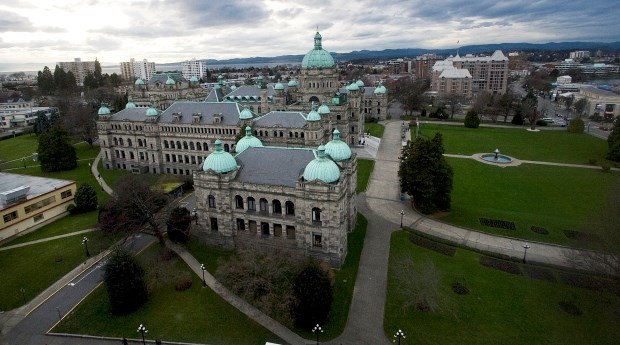Students rallying on the lawn of legislature and opposition members inside the house slammed the B.C. government Monday for not coming up with money to save English-as-a-second-language courses, in the face of federal cuts.
“Why is it that this government has known for two years that the federal government has vacated the field of English-language training and they have done nothing, nothing to fix it?” B.C. NDP Leader John Horgan asked of Advanced Education Minister Amrik Virk during question period.
The legislature’s public gallery was filled with Vancouver Community College students who travelled to Victoria to take part in a rally of about 300 people who want the provincial government to step in and fill the funding gap left by the federal government.
In 2012, the Conservative government announced it was axing an agreement with the B.C. government that meant colleges and universities lost $17 million in federal money to provide ESL training to immigrants and domestic students. The Ministry of Citizenship and Immigration Canada, which distributes the funding, will provide the money directly to not-for-profit, community-based language-education providers instead.
The Ministry of Advanced Education pledged about $17 million in one-time transitional funding for the 2014-15 school year, but has not come up with a plan for after that money runs out.
Camosun College received enough provincial money — about $2.4 million — to continue the ESL program for a year. Almost $8 million of the provincial funding went to Vancouver Community College, which trains nearly half of B.C.’s 9,000 adult ESL students. But colleges are warning that once that funding runs out next year, they’ll have to cancel a range of courses if the province doesn’t step up with more money.
Karen Shortt, president of the VCC faculty association, said she was finally granted a meeting with Virk Monday morning after almost a year of trying. She said she left the meeting even more frustrated.
“There’s no plan at this point for the 2,300 students who will have nowhere to go on Jan. 2,” Shortt told the crowd on the legislature lawn. “I hear the ministry saying we can’t afford to fund ESL. And I say, you can’t afford not to.”
Virk said while the B.C. government opposed the federal government’s plan to change the delivery model for ESL courses, ESL students can still take courses through 35 not-for-profit providers in more than 80 locations across the province. “So ESL students do have a place to study ESL as we speak.”
Critics counter, however, that colleges provide an opportunity for students to transition from language courses to academic and career-oriented programs.
Virk said the province provides block funding to post-secondary institutions and his staff will work with the colleges to find ways to make ESL sustainable.
Mohammad Salehi, 33, who arrived from Iran four months ago to take English courses at Camosun College, said he was “very happy” to see such a large crowd supporting ESL funding. “My first plan, learn English. After learn English, need a job,” Salehi said.
Rachael Grant of the Camosun College Student Society said ESL students are in the dark about the future of their English education. “A cut to ESL is a cut to the prospects and prosperity in B.C.,” Grant said. “It makes no sense to take away programming that is so effective and enables students to pursue their dreams.”



